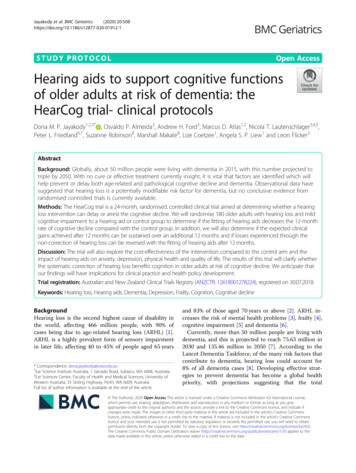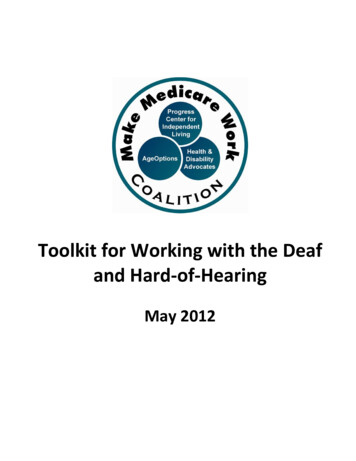
Transcription
Hearing the Voice of God, Following the Word of God, Experiencing the Will of God
What does it mean to hear God? We read of Him speaking toseveral people in Scripture. The first couple heard Him walking inthe Garden, then, heard His clear voice, questioning their hidingfrom Him. God has spoken in many ways. Does He still speaktoday? What does it mean to know He has spoken?Hearing God is not about weird voices and strange statements. Itis not about telling people what to do—God told me to tell you soand so. It is about having a heart that knows God, that hears Himand obeys what He says, that recognizes Him and worships Himfor Who He is—as God. It is about realizing that He is God and I amnot.At the beginning of his reign as king, God spoke to Solomon in adream and said, “Ask what you wish me to give you” (1 Kings 3:5).What a statement! As a young man in his 20s, Solomon recountedthe lovingkindness of the Lord toward his father David and nowtoward his son Solomon. He admitted his inexperience and needfor wisdom, “I am but a little child; I do not know how to go out orcome in” (1 Kings 3:7). Then, he asked for “an understandingheart” (1 Kings 3:9). Literally, the Hebrew phrase is “a hearingheart,” a heart that hears God and hears people. Why? So that hecould accurately judge the people, make right decisions, helppeople, help relationships, help the people be all God wantedthem to be.What did God think of this request? Solomon’s request for“discernment to understand justice” or literally, “hearing” to makejust decisions was indeed very “pleasing in His sight,” so much sothat God gave Solomon “a wise and discerning heart” (1 Kings3:10, 12). God delights in His people humbly seeking Him. Hewants us to walk and talk with Him and Him with us.To hear God, we need a cleansed heart and an available, obedientheart, not an obstinate heart as we read of in Romans 10:21. RonDunn often spoke of discerning God’s will. He noted three clearfactors we must deal with. 1) First, one’s Desire (assuming one issurrendered to God and His Will). 2) Second, one’s Opportunity(what is available to do or not do, where to go or not go, etc.). 3)Third, the element of ‘No Red Flags’ (Are there any “red flags”giving warning signals, a “Balaam’s donkey” stopping, blockingprogress, even speaking (Numbers 22:23-35)? Stop, don’t go thatway if there is any check of the Spirit, any lack of peace from theSpirit as the Divine Referee in life—Colossians 3:15). These threeelements give practical counsel for hearing and responding toGod.2
Hearing God is about acknowledging God for who He is as Godand worshiping Him. It is about activating faith, actions thatreveal a right relationship seen in obeying Him, not aboutstrange revelations.Some make rash statements about “God told me ” but what theysay does not line up with the clear revelation of the Word of God.Others declare God never speaks; we must simply do the best wecan and hope for the best. Still others give testimony of a closewalk with the Lord, of hearing Him give wise guidance fordecisions and His good answers to prayer. What should we thinkor do in light of these varying testimonies? First, we need to thinkthrough some hindrances and helps to hearing God.Hindrances and Helps to Hearing God—Many speak of the“promptings” of God or the urges of His Spirit, working in the mind,active in “the spirit,” the inner man or inner self often noted inScripture. Is this valid? What can we learn of these truths?Obedience to the promptings of God leads to joy and greatersensitivity to thepromptings of God. Wemust always be cautiousabout what we think, whatwe read or hear, and thethoughts we allow to lingerin our minds. What is aprompting from God? Whatdoes it communicate? Howdo we know it is from God?How do we know it is notfrom our own deceivedhearts or from a thoughtdart of the Evil One? Wemust know the Word ofGod and the Ways of Godto clearly discern the Will ofGod and to discern themessage found in thepromptings and leadingswe believe to be of Him.Here are some Hindrancesand some Helps in HearingGod.3
H INDRANCESTOH EARING G OD1. Not believing God speaks—If a person does not believe Godspeaks, then he or she will ignore what God could be clearlyspeaking.2. Not knowing How God speaks—How does God speak? First,God speaks by His Word and by His Spirit, always in agreementwith one another, never out of line with the character or natureof God. Second, God speaks in line with His nature. Psalm85:8 states, “I will hear what God the LORD will say; For He willspeak peace to His people, to His godly ones ” James 3:17states that the “wisdom from above is first pure, thenpeaceable ” The fruit of the Holy Spirit is “peace” (Galatians5:22). God speaks in a peaceful way, not rashly nor harshly norin a confusing way. He is never the author of confusion. FirstCorinthians 14:33 says very clearly, “for God is not a God ofconfusion but of peace, as in all the churches of the saints.”3. Not knowing how Willing the Lord is to speak—Jesus said to the“weary,” “Come to Me take My yoke learn from Me for Iam gentle and humble of heart” (Matthew 11:28-30). He isopen to speak, to lead anyone who will listen with a learner’sheart, ready to obey.4. Lack of Surrender to the Lord. As a result then, not Respondingwhen God speaks—When God speaks, He does so to help therelationship with Him. One’s relationship with the Lord is basedon trust, full trust. That means surrender to Him and His will,trusting He always knows best and does best. Jesus said inJohn 7:17 that “if any man is willing to do His will, he shallknow of the teaching, whether it is of God ” Romans 12:1-2adds the essential element of worshipful surrender—God isGod and is worthy to be worshiped and obeyed. In light of Hismany mercies outlined in Romans 1-11, surrender to Him isthe most reasonable and spiritually wise response. Along withthat is not allowing the world to squeeze us into its mold.Rather, based on who God is and what God has said, be“transformed by the renewing of your mind” so that one canknow by experience “what the will of God is.” What is this will?One can personally know and experience “that which is good[Greek—agathos, beneficial, helpful] and acceptable [Greek—euarestos, well pleasing, well fitting, very agreeable] andperfect [Greek—teleios, reaching the right goal, fulfilling theintended purpose].”When God speaks, when He clearly reveals His will and aperson does not respond in trust, the relationship is hindered,the communication cannot go forward. Jesus said seven times“He who has an ear, let him4hear what the Spirit says to thechurches” (Revelation 2:7, 11, 17, 29; 3:6, 13, 22).
5. Not aware of counterfeit guidance—There are manysupernatural beings around. The “thief,” the devil and demonsseek to “steal, and kill, and destroy” as Jesus warned (John10:10). The serpent in the Garden lied about God and aboutHis Word. He gave false guidance and counterfeit directionsthat led to sin and disobedience, fear, division rather thanoneness, hiding from God, and ultimately death (Genesis 3:119).Paul sought to connect every heart with God, helping peoplehear God clearly. How? Part of his work included “castingdown arguments and every high thing that exalts itself againstthe knowledge of God, bringing every thought into captivity tothe obedience of Christ” (2 Corinthians 10:5). Those“arguments” are part of the walls of unbelief raised up toblock people from truly hearing and knowing God as He is andas He speaks.Paul spoke of “every thought” pointing to hearing, specificallyhearing wrong thinking, instead of what God says. We are tohear God and obey. Jesus warned His disciples to “take heedand beware of the leaven of the Pharisees and Sadducees,”referring to words, teachings, and conversations infiltratinglike leaven, undermining belief and trust in God, even bringingconfusion about who God is and what God is saying and doing(Matthew 16:5-12). Be cautious about what you hear, how youhear, and who you hear it from, making sure you carefullyevaluate it ever looking to the Word of God!6. Deafness to God’s Voice because of disobedience to God’sWord and God’s will—the more one ignores or disobeys theVoice of God, the duller one’s spiritual hearing becomes. Godwarns in Hebrews 4:1-11 about disobedience, not trustingGod and acting on what He has said, about failing to mix HisWord with faith, about hardening the heart against Him.7. Greed, stinginess, unwillingness to give, also known by theHebraism an “evil eye,” results in spiritual darkness, theinability to see or understand spiritual reality. Jesus noted thisas the problem in Matthew 6:22-23. He contrasted this withhaving a clear eye or a “good eye,” a generous demeanor andactions that lead to being full of light and insight.1 Many donot see or hear or perceive God or God’s working because ofthe selfish or stingy set of the heart.1See Deuteronomy 15:7-11; Proverbs 23:6 (“a selfish man,” literally, “an evil eye”); Matthew 20:15;Mark 7:22 (“envy,” literally “an evil eye”).5
8. Pride—Pride says ‘I can handle life myself, I do not need helpor guidance.’ God knows this is foolish and He resists theproud and their choices. James 4:6 and 1 Peter 5:5 declare“GOD IS OPPOSED TO THE PROUD, BUT GIVES GRACE TO THE HUMBLE.”The Greek word translated “is opposed” pictures setting up inbattle array to fight against. That is a losing battle for theproud person.9. Undealt-with sin—When we do not deal with sin God’s way, wecontinue out of fellowship, out of the circle of clearcommunication. When we draw near with a repentant, humbleheart, God forgives, cleanses, and restores that person.10. Un-crucified self-agendas— Jesus calls each follower to “denyhimself,” say “no” to self, to self-agendas, to self-will. He madeit clear that each one must “take up his cross daily,” takingself and self-agendas to the place of execution, then “followMe,” follow what I say, the way I want one to act or speak(Luke 9:23).H ELPSTOH EARING G OD What can help us walk the right way? What can help us hear God?Here are some specific Helps to Hearing God 1. Spend Time in the Word of God—How? Consider this list: Read,Research/Dig, Ponder/Meditate, Memorize, Sing, Speak,Write the Word of God, Write/Review your insights and theinsights of others. This includes a daily “Quiet Time” in theScriptures and in prayer, staying tuned to God’s voice daily.2. Spend Time in Prayer—This includes speaking to God andlistening to Him. Get to know His ‘still small voice’ like Elijahheard as the “sound of a gentle blowing” like a soft breeze (1Kings 19:12). Listen carefully, thoughtfully to His Word.3. Sometimes we need to spend time in Fasting with Prayeralong with Time in the Word. Fasting is not a magic plan. It is adeliberate step at removing distractions and intensifyingconcentration. Most often fasting is from food, substitutingthat time for extra time with God. It could consist of ‘fasting’from media, time off from a screen (computer, smart phone,tablet, television, etc.)—anything that could distract fromhearing God. The key factor is concentration on the Lord, HisWord, His will, and hearing from Him.6
4. One help in hearing God is praying with others, especially“with those who call on the Lord from a pure heart” (2 Timothy2:22). This refers to continuous calling, not hit or miss or onlyin rare seasons. It is a lifestyle of seeking the Lord, of timewith Him, of prayer time with Him together with others. And itis not centered around someone’s agenda; it is from “a pureheart,” clear with God and clear with others, like those in 1Timothy 2:8 who “pray, lifting up holy hands, without wrathand dissension.” Each is walking with the Lord “with holyhands,” not soiled with sin, not dishonest or selfish or strivingto get one’s own way.5. Reading the Biographies of those who have walked with Godhelps us hear. We can see how they sought the Lord, how Godspoke to them and how they responded. Here is an excellentexample from the life of George Mueller (also spelled Muller).Read this testimony and ponder his daily habits and the spiritin which he sought to do the will of God.George Mueller’s method for discerning the Will of God is practicaland marked by the heartbeat of one who walked with God. Histestimony in his own words is given by Basil Miller (GeorgeMuller—Man of Faith and Miracles, pp. 50-51) 7
Many asked Mr. Muller how he sought to know the will of God, inthat nothing was undertaken, not even the smallest expenditure,without the feeling certain he was in God’s will. In the followingwords he gave his answer.1. I seek at the beginning to get my heart into such a state thatit has not will of its own in regard to a given matter. Ninetenths of the difficulties are overcome when our hearts areready to do the Lord’s will, whatever it may be. When one istruly in this state, it is usually but a little way to theknowledge of what His will is.2. Having done this, I do not leave the result to feeling or simpleimpressions. If so, I make myself liable to great delusions.3. I seek the will of the Spirit of God through or in connectionwith the Word of God. The Spirit and the Word must becombined. If I look to the Spirit alone without the Word, I laymyself open to great delusions also.4. Next I take into account providential circumstances. Theseplainly indicate God’s will in connection with His Word andSpirit.5. I ask God in prayer to reveal His will to me aright.6. Thus through prayer to God, the study of the Word andreflection, I come to a deliberate judgment according to thebest of my ability and knowledge, and if my mind is thus atpeace, and continues so after two or three more petitions, Iproceed accordingly. In trivial matters and in transactionsinvolving most important issues, I have found this methodalways effective.And did this plan work? one asks. Let Mr. Muller’s testimonyanswer.“I never remember,” he wrote three years before his death,“in all my Christian course, a period now of sixty-nine yearsand four months, that I ever SINCERELY AND PATIENTLYsought to know the will of God by the teaching of the HolyGhost, through the instrumentality of the Word of God, but Ihave been always directed rightly. But if honesty of heart anduprightness before God were lacking, or if I did not patientlywait upon God for instruction, or if I preferred the counsel ofmy fellow men to the declarations of the Word of the livingGod, I made great mistakes.”[From George Muller—Man of Faith and Miracles, by Basil Miller, pp. 50-51.See also, Autobiography of George Muller , p. 196]8
On Meditation and Prayer[In his Autobiography, George Mueller alsospeaks of how God used the Scriptures tostrengthen and guide him in prayer,discovering that in meditating on the Wordof God, God speaks, encourages, rebukes,and leads in prayer, guiding in prayers forhimself and others. Here are his words.]“I saw more clearly than ever, that the firstgreat and primary business to which Iought to attend every day was, to have mysoul happy in the Lord. [Likely, today’sterminology would be deep “peace andjoy,” having a clear conscience before theLord and others and a sure sense of surrender and dependenceon Him (Acts 24:16; Romans 12:1-3).] The first thing to beconcerned about was not, how much I might serve the Lord, how Imight glorify the Lord; but how I might get my soul into a happystate, and how my inner man might be nourished. For I might seekto set the truth before the unconverted, I might seek to benefitbelievers, I might seek to relieve the distressed, I might in otherways seek to behave myself as it becomes a child of God in thisworld; and yet, not being happy in the Lord, and not beingnourished and strengthened in my inner man day by day, all thismight not be attended to in a right spirit. Before this time mypractice had been, at least for ten years previously, as an habitualthing, to give myself to prayer, after having dressed in the morning.Now I saw, that the most important thing I had to do was to givemyself to the reading of the word of God and to meditate on it, thatthus my heart might be comforted, encouraged, warned, reproved,instructed; and that thus, whilst meditating, my heart might bebrought into experimental communion with the Lord. I began,therefore, to meditate on the New Testament, from the beginning,early in the morning. The first thing I did, after having asked in afew words the Lord’s blessing upon His precious Word, was tobegin to meditate on the Word of God, searching, as it were, intoevery verse, to get blessing out of it; not for the sake of preachingon what I had meditated upon; but for the sake of obtaining foodfor my own soul.9
The result I have found to be almost invariably this, that after avery few minutes my soul has been led to confession or tothanksgiving, or to intercession, or to supplication; so that though Idid not, as it were, give myself to prayer, but to meditation, yet itturned almost immediately more or less into prayer. When thus Ihave been for awhile making confession, or intercession, orsupplication, or have given thanks, I go on to the next words orverse, turning all, as I go on, into prayer for myself or others, as theWord may lead to it; but still continually keeping before me, thatfood for my own soul is the object of my meditation. The result ofthis is, that there is always a good deal of confession,thanksgiving, supplication, or intercession mingled with mymeditation, and that my inner man almost invariably is evensensibly nourished and strengthened and that by breakfast time,with rare exceptions, I am in a peaceful if not happy state of heart.Thus also the Lord is pleased to communicate unto me that which,very soon after, I have found to become food for other believers,though it was not for the sake of the public ministry of the Wordthat I gave myself to meditation, but for the profit of my own innerman.The difference then between my former practice and my presentone is this: Formerly, when I rose, I began to pray as soon aspossible, and generally spent all my time till breakfast in prayer, oralmost all the time. At all events, I almost invariably began withprayer, except when I felt my soul to be more than usually barren,in which case I read the Word of God for food, or for refreshment,or for a revival and renewal of my inner man, before I gave myselfto prayer. But what was the result? I often spent a quarter of anhour, or half an hour, or even an hour on my knees, before beingconscious to myself of having derived comfort, encouragement,humbling of soul, etc.; and often, after having suffered much fromwandering of mind for the first ten minutes, or a quarter of anhour, or even half an hour, I only then began really to pray. Iscarcely ever suffer now in this way. For my heart being flourishedby the truth being brought into experimental fellowship with God, Ispeak to my Father, and to my Friend (vile though I am, andunworthy of it!) about the things that He has brought before me inHis precious Word.10
It is as plain to me as anything, that the first thing the child ofGod has to do morning by morning is to obtain food for his innerman. As the outward man is not fit for work for any length of time,except we take food, and as this is one of the first things we do inthe morning, so it should be with the inner man. We should takefood for that, as everyone must allow. Now what is the food for theinner man? Not prayer, but the Word of God; and here again notthe simple reading of the Word of God, so that it only passesthrough our minds, just as water runs through a pipe, butconsidering what we read, pondering over it, and applying it to ourhearts.When we pray we speak to God. Now, prayer, in order to becontinued for any length of time in any other than a formalmanner, requires, generally speaking, a measure of strength orgodly desire, and the season, therefore, when this exercise of thesoul can be most effectually performed, is, after the inner man hasbeen nourished by meditation on the Word of God, where we findour Father speaking to us, to encourage us, to comfort us, toinstruct us, to humble us, to reprove us. We may thereforeprofitably meditate, with God’s blessing, though we are ever soweak spiritually; nay, the weaker we are, the more we needmeditation for the strengthening of our inner man. There is thusfar less to be feared from wandering of mind, than if we giveourselves to prayer, without having had previously time formeditation.I dwell so particularly on this point because of the immensespiritual profit and refreshment I am conscious of having derivedfrom it myself, and I affectionately and solemnly beseech all myfellow believers to ponder this matter. By the blessing of God Iascribe to this mode the help and strength which I have had fromGod to pass in peace through deeper trials in various ways than Ihad ever had before; and after having now above forty years triedthis way, I can most fully, in the fear of God, commend it. Howdifferent when the soul is refreshed and made happy early in themorning, from what it is when, without spiritual preparation, theservice, the trials, and the temptation of the day come upon one![Autobiography of George Muller, (Westminster LiteratureResources, 2003), pp. 152-153, 154]11
How Does God Speak?Here are some ways we read of in Scripture. With each way Godspeaks there is a corresponding counterfeit way we sometimesread or hear about. This is How Our Enemies Confuse or Deceive(world system, “flesh,” and the devil)HOW GOD SPEAKSANDHOW COUNTERFEITS CONTRADICT1. God speaks through the Word of God—We have mentioned this,specifically these actions: Read, Meditate, Memorize, Sing, Speak,Write the Word of God. Think through and pray through what youread.What is the counterfeit to this? In Matthew 4:6, we read of thedevil tempting Jesus through his misuse of and confusing of theWord of God just as he did in the Garden of Eden (Genesis 3:1-7).Jesus knew the Word and responded with a true understandingand application of the Word. We must depend on the Spirit of Godto guide us and teach us as we walk daily. Another tactic usedagainst God and His people is to doubt the Word. We read of thatin Genesis 3, as the serpent cast doubt on God and His Word “has God said” even implying that God had lied, “you surely shallnot die” (Genesis 3:1, 4). Another tactic in this battle arena isgetting us to ignore the Word; just leave it out of our thinking, ourdecision making. Similar is the battle of forgetting the Word.Another danger is treating the Word for information only—Just theFacts without Faith. This is information without transformation,without obedient faith application (see Hebrews 3:12-13, 18-19;4:2). A walk with God is not mere intellectual exercise or emotionalstimulation; it is a walk of choices in line with His Word, Hischaracter, His nature, joining Him in His work. In Scripture, weread of those who walked with God. We can learn from them andothers throughout the ages in Scripture.12
2. God Can Speak Audibly. This is rare in Scripture, though ithappened. Some today have testified that they heard God’s voicein an audible way, but that is even rarer. God can do that; He isGod. The key to our walk is paying attention to what we have eachday—His Word, the work of the Spirit of God (teaching the Word,convicting of sin, correcting our walk, encouraging our walk withHim), and life as part of the Body of Christ—the “one another”factor is meant to build us up and encourage us in our walk. Thereare over 80 “one another” commands in Scripture. If we arewalking faithfully in these areas, then, if God chooses to speakaudibly, we know that something unique is happening—Neverforget that what we ‘hear’ must agree with the Word of God, Hischaracter and His nature.Counterfeit sounds. There are supernatural events occurringtoday, but that does not mean that any of those events are fromGod. The devil and demons can create sounds, but it is counterfeitnoise, misleading uproars, and all sorts of confusion designed todeceive and ultimately destroy. Continue in the Word of God.3. Dreams/Visions—In Scripture, God spoke from time to time indreams and visions, communicating His will for that person (orpeople) for that time (Matthew 1:20-24; 2:12, 13-15). He can stilldo that, but, again, we need to remember the truths in #2 above—pay attention to God each day in the ‘normal’ paths of life in ourspiritual journey, especially His written Word.Counterfeit dreams/visions. There are many counterfeit dreamsand visions; we can recognize those by the fact that they do notmatch the Word of God. Satan and his messengers pose as‘angels of light’ while leading into greater darkness (2 Corinthians11:14-15). False teachers speak falsehoods, many based on their‘dreams’ or ‘visions’ (Colossians 2:18-19; 2 Peter 2:1-22). Wemust be aware and cautious. A few years ago, I was told that banktellers are not trained to spot counterfeit money by studyingcounterfeit money. They are trained by knowing real currency sowell that a counterfeit can be spotted—it does not ‘feel’ right,something is ‘wrong’ here. Of course, there are chemical tests andother options today, but the reality is that a counterfeit can beshown to be a counterfeit. Does it match the Word of God and thecharacter of God? If not, it does not matter how vivid the vision ordream—it’s bogus.13
Ephesians 6:11 mentions the “schemes,” “wiles,” or “methods” ofthe devil. These are a translation of the Greek word methodeias,referring to the devil’s schemes or methods of operation alwaysdesigned to confuse, distress, deceive, tempt, and mislead. He isthe “devil,” the translation of the Greek word diabolos, the onewho throws through like a spear, the divider, the one who causesdivision through cunning and lying (see Genesis 3). We need tokeep this in mind as we seek to follow the Lord and His leading.4. Impressions/Promptings—While some speak of ‘promptings’from the Lord, we must ever maintain caution in this area. DoesGod give impressions and promptings? Yes, indeed. He gives asense of peace or unrest or uneasiness over a matter. There maybe a check over some detail or a caution point. The best advice isto stop, evaluate, seek the Lord in prayer, seek wise counselwhere needed, and move cautiously.Misleading impressions. We need to remember that emotions areemotions. They are the ‘caboose’ that follows the ‘engine’ ofchoices, not the engine that drives or pushes choices. Emotionscannot always be trusted; they can come from any number ofsources, including medical needs, physical weariness, andemotional burnout.Charles Swindoll has given a good word of counsel—using theacrostic H.A.L.T.—Stop, Never make a major decision if you are H—Hungry, A—Angry, L—Lonely, or T—Tired. That’s wise advice, a goodcheck-up. Recall Elijah in the wilderness (1 Kings 19:1-8). After atremendous victory over the wicked prophets of Baal on MountCarmel, he ran for his life, knowing that Queen Jezebel hadthreatened his death. He was physically and emotionally drainedand wanted to die. Obviously, a misleading thought. In thewilderness, the Angel of the LORD met him and fed him; Elijahneeded some good rest, food, and water. The Angel of the LORDgave him that twice and then Elijah continued his journey to MountHoreb where God met him, spoke to him, and gave him his newassignments (1 Kings 19:9-18). Caution: remember thatimpressions or promptings can be thought darts of the enemymeant to deceive, discourage, or in some way sidetrack us(Ephesians 6:11, 16). They can be simply fleshly desires, deceitfulto us and others. Caution and wisdom are the order of the day. If itpleases the “flesh,” the sinful desires, it is not from God, nor doesit agree with His Word (and the ‘pleasure’ is short-lived—Hebrews11:25-26).14
5. God speaks through Others—We mentioned this, in part, in #2,concerning the “one another’s” in our lives. God works through theBody of Christ, especially the local fellowship of believers, thoseclose to us, who can speak into our lives. Part of the “Others” Hecan use are the Authorities in our lives. This includes parents andfamily—it can be amazing the wisdom that can come from a dad ormom, an uncle, a grandmother or grandfather, even a brother orsister. The key is listening for and looking for the voice and hand ofGod. Authorities in other areas can also be used by God to speakinto our lives. That includes those who are part of the church—pastors, teachers, etc. Pay attention to what one may say. Often,God is speaking. At work, a boss or supervisor can be used by God.Don’t discount what that person may say. The same is true ofthose at school or even in government. The Apostle Paul foundGod working through many, such as the Roman Centurion Juliuson the Mediterranean voyage to Rome (Acts 27). David and hismen discovered God using even antagonistic Philistines to directhim and his men back to Ziklag. There they discovered, and Godled them, in a whole new set of circumstances that turned out verywell for them, their families, and the nation of Israel (see 1 Samuel29-30).Counterfeits. There are those who would lead us astray, notnecessarily intentionally, but because they are not following Godthemselves, nor do they know how to hear His voice. Thosemisleading ways can come from the world system with its worldlythinking. This includes ‘opinion polls’ in which people gatheropinions seeking to push their agenda. Much PR is fallible. These‘public relations’ talking points are spun a certain way and oftenloaded with lies, deceit, and misleading stories. A tongue-in-cheekstatement from long ago warned of three kinds of lies—white lies,black lies, and statistics. That is the way of the world, including“public sentiment.” Just because many think a certain way doesnot mean that is the correct way (Proverbs 14: 12).Another trap found within the world is listening to susceptiblepeople—people who unwittingly yield to thought
that God gave Solomon “a wise and discerning heart” (1 Kings 3:10, 12). God delights in His people humbly seeking Him. He wants us to walk and talk with Him and Him with us. To hear God, we need a cleansed heart and an available, obedient heart, not an obstinate heart as we read of in Romans 10:21. Ron











